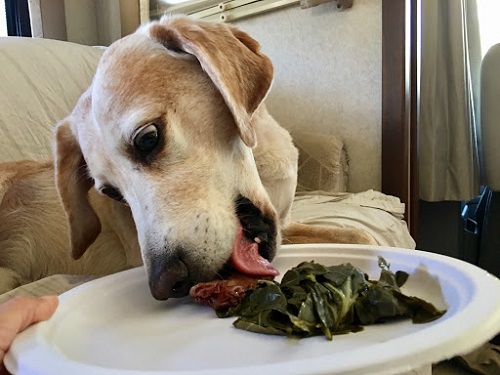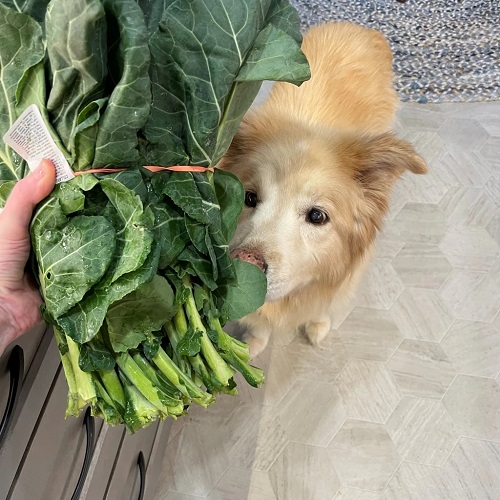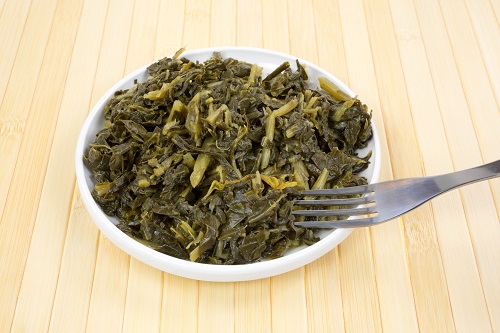Can Dogs Eat Collard Greens? Can you add this healthy option to their diet? Is it safe for them? Find out all the answers!
We all want to include the nutritional benefits of green leafy vegetables in our diet, but what about the pooches? Can Dogs Eat Collard Greens? How beneficial are they? And how should it be offered? Stick to the article to get the answers!
What is Collard Greens?
Collard green is a nutritious, delicious cuisine of the United States. It is considered a member of the cabbage family and a cultivar of Brassica oleracea.
Collard greens are a leafy green vegetable that is a member of the Brassica family, which includes broccoli, cauliflower, and cabbage. Collard greens are known for their dark green, large, flat, and broad leaves that grow from a central stem.
Check out Can Dogs Eat Snickerdoodles? here
Can Dogs Eat Collard Greens?

In general, collard greens can be a nutritious addition to a dog’s diet. They are a good source of fiber, vitamins C and K, and various minerals, all of which can benefit a dog’s overall health. However, it is important to note that collard greens should be fed to dogs in moderation and as part of a balanced diet.
It is also important to properly prepare collard greens before feeding them to a dog. Collard greens should be washed thoroughly to remove any dirt or debris, and they should be cooked before being served to a dog. Raw collard greens may be difficult for a dog to digest and may cause gastrointestinal upset.
The veggie isn’t inherently toxic for the dog, but it requires a certain amount of precautions you must take care of while feeding it to the dogs.
Are Collard Greens Safe for Dogs?
So, Can Dogs Eat Collard Greens? Well, the answer to that question is yes. Collard greens should be given to dogs after cooking it nicely, and that too only in small portions. If served raw to dogs, then it will be difficult to digest.
Check out My Dog Ate Potting Soil ! What Should I Do? here
Health Benefits of Collard Greens

If moderation is the key, then collard greens make for a healthy and balanced diet. Collard greens are nutritious vegetable that offers a range of health benefits. Here are some of the main health benefits of collard greens:
- High in nutrients: Collard greens are a rich source of vitamins and minerals, including vitamin C, vitamin K, vitamin A, calcium, iron, and potassium.
- May help lower inflammation: Collard greens contain antioxidants that can help lower inflammation in the body, which may reduce the risk of chronic diseases such as heart disease, diabetes, and cancer.
- May help lower cholesterol levels: Collard greens contain fiber and other compounds that may help lower cholesterol levels, which can reduce the risk of heart disease.
- May help improve digestion: The fiber in collard greens can help promote healthy digestion and prevent constipation.
- May help support bone health: Collard greens are a good source of calcium and vitamin K, which are important nutrients for bone health.
- May help support eye health: Collard greens contain lutein and zeaxanthin, two nutrients that are important for eye health and may help prevent age-related macular degeneration.
- May help support weight loss: Collard greens are low in calories and high in fiber, which can help support weight loss and healthy weight management.
A Few Health Concerns
While collard greens offer many health benefits, there are a few health concerns to be aware of:
- Oxalates: Collard greens contain oxalates, which can interfere with the absorption of calcium and may contribute to the formation of kidney stones in some people.
- Pesticides: Collard greens may be treated with pesticides, so it is important to choose organic options when possible or to thoroughly wash conventionally grown collard greens before consuming them.
- Interference with certain medications: Collard greens contain vitamin K, which can interfere with blood-thinning medications such as warfarin. If you are taking blood-thinning medication, talk to your healthcare provider before adding collard greens to your diet.
- Digestive issues: Some people may experience digestive issues such as gas or bloating when consuming large amounts of collard greens. If you experience digestive discomfort, try reducing your intake or cooking the collard greens thoroughly to make them easier to digest.
Overall, collard greens are generally safe for most people to consume in moderation as part of a healthy diet. If you have any concerns or underlying health conditions, it is always best to consult with your healthcare provider before making any significant dietary changes.
Check out Are Banana Peels Safe for Dogs? here
How to Feed Collard Greens to Dogs?

Collard greens can be a nutritious addition to a dog’s diet when fed in moderation and prepared properly. Here are some tips on how to feed collard greens to dogs:
- Wash the collard greens thoroughly to remove any dirt or debris.
- Cook the collard greens by boiling, steaming, or sautéing them until they are tender. Raw collard greens may be difficult for dogs to digest and may cause gastrointestinal upset.
- Chop the collard greens into small pieces that are easy for your dog to chew and digest.
- Feed collard greens to your dog in moderation as part of a balanced diet. Too many collard greens can cause digestive issues, so it is important to start with a small amount and gradually increase the serving size.
- Monitor your dog for any signs of digestive upset, such as diarrhea or vomiting. If your dog experiences any adverse reactions, stop feeding collard greens and consult with your veterinarian.
Note: Don’t add salt, garlic, or onion – It can cause gastrointestinal disturbances in your pooches.
Can Dogs Eat Collard Greens Raw?
While collard greens can be a nutritious addition to a dog’s diet, it is not recommended to feed them raw. Raw collard greens can be difficult for dogs to digest and may cause gastrointestinal upset, including symptoms such as vomiting or diarrhea.
Therefore, it is best to cook collard greens before serving them to your dog. Boiling, steaming, or sautéing the collard greens until they are tender can make them easier to digest for your dog. Additionally, washing the collard greens thoroughly before cooking them can help remove any dirt or debris.
Check out Are Banana Chips Safe for Dogs? here
Something Essential
Dogs can’t adopt a new food instantly; try to offer it in small amounts and observe. If you see any adverse reactions in canines, visit your vet.
Note: Our information is for general awareness and education, not as a substitute for medical care.
How Much Collard Greens Should be Given to Dogs?
The amount of collard greens that can be given to dogs depends on their size, age, and overall health. In general, collard greens should be fed to dogs in moderation, as too much of this vegetable can cause digestive issues.
As a rough guideline, you can offer collard greens as a supplement to your dog’s regular diet, and aim for about 10% of their overall food intake to come from vegetables, including collard greens. For example, if your dog eats one cup of food per meal, you could include up to 1/10th of a cup of cooked collard greens in their meal.
It is also important to start with a small number of collard greens and gradually increase the serving size to see how your dog tolerates them. Some dogs may be more sensitive to collard greens than others, and feeding too much too quickly can cause digestive upset.
Check out Is Orange Chicken Bad for Dog? here
Do Collard Greens Digest?
Yes, collard greens do digest in the body. The process of digestion breaks down food into smaller particles, which are then absorbed by the body and used for energy and other functions.
Collard greens are a good source of dietary fiber, which is an important component of a healthy diet. Fiber is not digested by the body, but instead, it helps to regulate digestion by adding bulk to the stool and promoting bowel regularity.
While collard greens can be a nutritious addition to a dog’s diet, it is important to prepare them properly to aid in digestion. Cooking collard greens until they are tender can make them easier for dogs to digest, as raw collard greens can be difficult to break down and may cause gastrointestinal upset.
Quick Takeaways
Can Dogs Eat Collard Greens? Yes, they can it is an additional host of nutrients. With proper cooking tips, you are allowed to offer it in moderation. Collard greens are a nutritious addition to a dog’s diet. Raw collard greens should not be given to dogs, as they can be difficult to digest and cause gastrointestinal upset.
